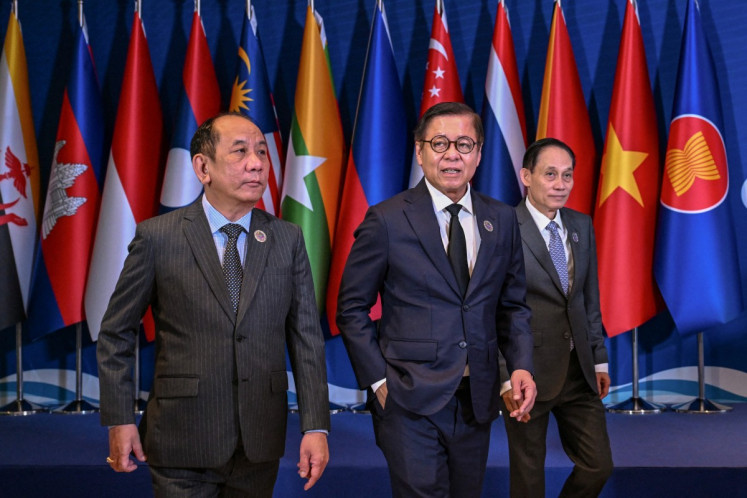Popular Reads
Top Results
Can't find what you're looking for?
View all search resultsPopular Reads
Top Results
Can't find what you're looking for?
View all search resultsWhere have all the statesmen gone?
If former presidents demonstrate true statesmanship, they can help preserve the integrity of the office, foster national unity and provide valuable guidance to current leaders. Once they enter practical politics, however, they undermine the respect and reverence accorded to the presidency.
Change text size
Gift Premium Articles
to Anyone
 Up close and personal: President Joko “Jokowi” Widodo (left) speaks with Indonesian Democratic Party of Struggle (PDI-P) chairwoman Megawati Sukarnoputri (center) as the party’s presidential candidate, Ganjar Pranowo, looks on during the PDI-P national meeting in Jakarta on June 6. (Antara/Akbar Nugroho Gumay)
Up close and personal: President Joko “Jokowi” Widodo (left) speaks with Indonesian Democratic Party of Struggle (PDI-P) chairwoman Megawati Sukarnoputri (center) as the party’s presidential candidate, Ganjar Pranowo, looks on during the PDI-P national meeting in Jakarta on June 6. (Antara/Akbar Nugroho Gumay)

As Indonesia’s democratic backsliding continues, the nation is struggling to find figures who can provide wise and steady counsel. In the run-up to the 2024 elections, we may ask, like Pete Seeger in his song from the 1950s, “Where have all the statesmen gone?”
We are watching a departing President push to influence the selection of his successor for the sake of his flagship programs – hence his legacy – through cawe-cawe, a Javanese expression meaning “helping to finish a job”. While this sort of political stunt raises real ethical questions, eminent persons who might be able to deliver a message of restraint to President Joko "Jokowi" Widodo seem to be engaging in forms of practical politics themselves, if not seeking the role of kingmaker.
In his latest effort to remind President Jokowi of his responsibility to protect Indonesian democracy, former president Susilo Bambang Yudhoyono (SBY) released a small book titled Pilpres 2024 dan Cawe-cawe Presiden Jokowi (The 2024 presidential election and President Jokowi’s cawe-cawe) on Monday, which SBY said was written for his Democratic Party members.
In the 27-page booklet, SBY expresses his views about his successor’s actions ahead of the 2024 election, including Jokowi’s deep involvement in the presidential and vice presidential nominations, as well as his alleged preference for certain candidates and prejudice against former Jakarta governor Anies Baswedan, who has been nominated by the Coalition for Change, consisting of the Democratic Party, the NasDem Party and the Prosperous Justice Party (PKS).
Previously, SBY had written on Twitter that he was seeking an amicable relationship with Jokowi and former president Megawati Soekarnoputri for the good of the nation.

While SBY’s friendly reminder is worth listening to, the public is aware that the sixth president of Indonesia is perhaps the most influential figure in the Democratic Party, which is striving to return to power after being out of the ruling coalition for almost a decade. The party is thought to be insisting that the Coalition for Change pick Dem chairman Agus Harimurti Yudhoyono, SBY’s eldest son, as Anies’ running mate.
Anies has promised to announce his running mate after returning from the haj, but it is obvious that the tug-of-war within the coalition has prevented him from settling the issue of the VP pick beyond doubt. Anies’ failure to name a running mate has also been blamed for his recent slide in public opinion polling.
If SBY’s call for Jokowi to exercise restraint is doomed to fail, the same goes for Megawati’s. As the matriarch of the Indonesian Democratic Party of Struggle (PDI-P), Megawati aims to lead the ruling party to a hat trick of legislative and presidential electoral victories. She has won respect from many for allowing the party’s best bets to run for president – Jokowi in 2014 and 2019, and now Ganjar Pranowo in 2024 – but she may not be the right person to preach about democratic ideals given her vested interests.
Moreover, the party has attempted to undermine democracy by pushing for the reinstatement of a closed-list electoral system. The Constitutional Court recently upheld the prevailing open-list representation mechanism, which has proven to be more transparent than the old one, against the PDI-P’s wishes.
We envy the United States, which despite its recent struggles remains a role model of democracy, for the behavior of its former presidents – at least most of them – who refrain from practical politics and from interfering in a ruling government.
If former presidents demonstrate true statesmanship, they can help preserve the integrity of the office, foster national unity and provide valuable guidance to current leaders. However, once they enter practical politics, they undermine the respect and reverence accorded to the presidency.
So where have all the statesmen gone? The desire for power, as Seeger might suggest, “has picked them every one”.









